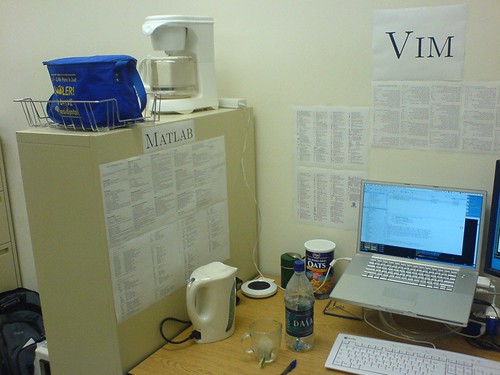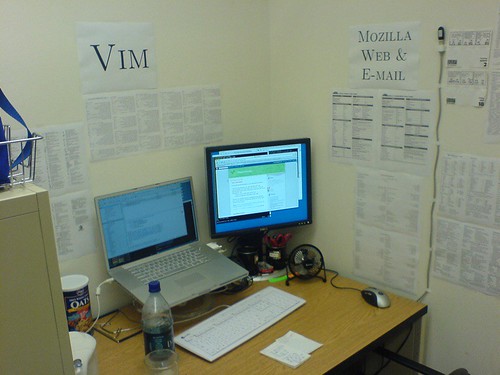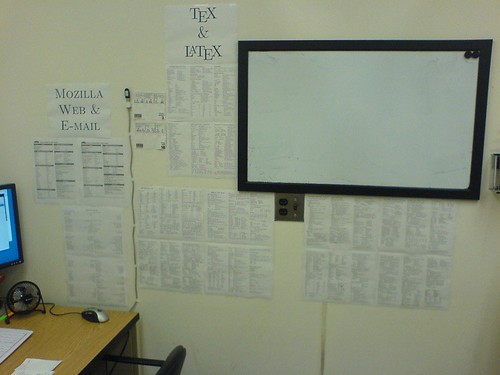- Fortran 90 (f90) Quick Reference Card
- Vim Quick Reference Card
- Python 2.5 Quick Reference Card
- Vim-LaTeX Suite Quick Reference Card
- Perl Quick Reference Card
- ASCII Quick Reference Card
Personal weblog of Ted Pavlic. Includes lots of MATLAB and LaTeX (computer typesetting) tips along with commentary on all things engineering and some things not. An endless effort to keep it on the simplex.
Showing posts with label refcards. Show all posts
Showing posts with label refcards. Show all posts
Wednesday, February 16, 2011
More Quick Reference Cards
Remember that time when I was quick reference card happy [1, 2, 3, 4, 5]? Today, I accidentally found another good quickref card blog post by someone else (Refcards by Michael Goerz; see the original post for the source code and other versions of these cards):
Labels:
ASCII,
Emacs,
f90,
Fortran,
gdb,
MySQL,
Perl,
programming,
Python,
quick reference,
quickref,
refcards,
reference cards,
scripts,
SQL,
Subversion,
svn,
unix,
Vim,
VIM-LaTeX
Monday, July 23, 2007
The Quick Reference Site (Cards and Books)
UPDATE 3: I did find the source of that regular expression card at Gordon McKinney's Pro IT Blog. Well, it's not a LaTeX source, but it's at least in letter format.
UPDATE 2: I found another good list of quick reference cards at the plantOzh blog. It includes a a regexp card, Perl 5 booklet, and CSS cards (1.0, 2.0). Yes, these cards are archived at the blog, so all of the commentary below still applies.
UPDATE 1: It's also annoying when someone simply archives existing quick reference cards because sometimes those archives use A4 paper. If these were linked to their origins, the source code (perhaps LaTeX) might be available, making a conversion to letter paper easy.
Lately, I have been quick reference happy [1, 2, 3, 4]. I cannot explain why, but I suddenly want to surround myself with quick references.
I think I found a great new quick reference resource. It's The Quick Reference Site, which features quick reference cards, e-books, and other papers and tutorials. From the site:
Throughout the years I have collected a huge pile of documents that deal with almost every aspect of software development. The purpose of this site is to centralize this information and to make it available to everyone who may need it or shares my passion on this subject. There are still a lot of documents in my "archive" that I like to share with you all.As far as I can tell so far, the author archives quick references that he has found over time and links us, the readers, to those archives. The advantage of this is that it minimizes the chances of broken links. The disadvantage is that the archives may not be the most recent versions. Additionally, if this site ever goes down and our bookmarks point there, those bookmarks will be broken.
At the moment this site represents only a fraction of what I want to provide, so a lot of work still needs to be done. As a result, you should consider this site as a work in progress. I'll try to keep you updated on the most challenging, powerful and continuously evolving software technologies of the moment. I hope that especially Java and C++ fanatics (like myself) will find some valuable information over here.
Some quick reference cards that I want to point out (if you go to his list, you can also read descriptions of these programs):
- Cascading Style Sheets 1.0
- CVS Quick Reference Card
- CVS Quick Reference Card (LG)
- PHP Cheat Sheet
- PHP 4 Reference Card
- The One Page Linux Manual
- UNIX commands reference card
- AMSTeX Reference Card 1.3
- vi Reference Card (HP)
- Vi Reference Card
- vi Quick Reference
- VIM Quick Reference Card
- GNU Calc Reference Card
- Bash Quick Reference
- LINUX System Call Quick Reference
- LINUX Admin Quick Reference
- Subversion Quick Reference Card
- Cheat Sheet Subversion
- MySQL-4.02a
On a slightly unrelated note, you can also check out Hawk Wings to find a QuickSilver quick reference and the QuickSilver user manual.
Labels:
bash,
ebooks,
Linux,
Mac OS X,
macosx,
manuals,
osx,
productivity,
quick reference,
quickref,
QuickSilver,
refcards,
reference cards,
regexp,
regexps,
regular expressions,
tex,
TeX/LaTeX,
texlatex,
tutorials,
unix,
Vim
Thursday, July 19, 2007
Tech. Cheat Sheets!
Check out the recent "Developer’s Alarm: 200+ Hotkeys To Boost Your Productivity" from Smashing Magazine for more hotkeys. This focusses on Windows apps, but there are some apps that have cross-platform support, and so this isn't an entirely worthless post.
In the spirit of previous posts [1, 2, 3], here are some more!
I found TechCheatSheets.com, which includes some nice reference sheets, and some broken links. However, it got me thinking about "cheat sheet," which got me searching, and I found these popular links:
- Mozilla Firefox Cheat Sheet (HTML, PDF)
- Mozilla Thunderbird Cheat Sheet (HTML, PDF)
My (Reference) Desk
Now that I have compiled all of these quick references [1, 2, 3], I can put them together to surround myself in easy-to-access information. In fact, I will. I did. Here it is! From left to right (pictures taken with my wonderful phone and stored in a flickr photoset)...
Labels:
desk,
office,
productivity,
quick reference,
refcards,
typography
Hot Key References
NOTE: The two updates below may serve as good LaTeX examples featuring the use of multicol.
UPDATE 2: I have used the Thunderbird list to make a Thunderbird quick reference PDF (LaTeX source available).
UPDATE 1: I have used the Camino list to make a Camino quick reference PDF (LaTeX source available).
I have been posting about quick references a lot lately [e.g., 1, 2]. I found another good quick reference site, allhotkeys.com. It has lots of software hotkey quick references. For example,
- Mozilla Firefox hotkeys
- Mozilla Firefox extensions hotkeys
- Mozilla Thunderbird hotkeys
- Camino hotkeys
- Safari hotkeys
- Microsoft Word hotkeys
- Microsoft Excel hotkeys
- Microsoft PowerPoint hotkeys
- Remote Desktop hotkeys
- Mac OS X Keyboard shortcuts
- iTunes hotkeys
- GMail hotkeys
- UNIX and Linux hotkeys
- Command line keyboard shortcuts
- ...and lots more...
Labels:
Camino,
examples,
Firefox,
hot keys,
hotkeys,
latex,
latex examples,
Mozilla,
productivity,
quick reference,
quickref,
refcards,
Safari,
shortcuts,
tex,
TeX/LaTeX,
texlatex,
thunderbird,
tools,
typography,
unix
Wednesday, July 18, 2007
MATLAB Quick Reference Cards (and more)
UPDATE: I list an AMSTeX reference card below. There is also an AMSLaTeX reference card available at refcards.com.
This is meant to be a follow-up to the "TeX Reference Card (and others)" post.
I found a list of a bunch more quick reference cards, which include applications/packages like MATLAB, MATLAB toolboxes, Perl, MFC, MySQL, Linux, UNIX, Vi, Vim, Windows, AMSTeX, TeX, and a bunch more...
However, I was just looking for MATLAB quick reference cards. So, here are these (some of which did not come from the above site):
- MATLAB quick reference
- MATLAB toolboxes quick reference
- MATLAB reference card meant for an ENG101 class
- MATLAB reference card
- An edited MATLAB reference card
Labels:
AMSLaTeX,
AMSTeX,
latex,
Linux,
MATLAB,
MFC,
Microsoft Windows,
MySQL,
Perl,
quick reference,
refcards,
reference cards,
tex,
TeX/LaTeX,
texlatex,
typography,
unix,
Vim,
windows
Tuesday, July 10, 2007
TeX Reference Card (and others)
UPDATE 3: I found the source of the popular LaTeX cheat sheet. It includes a PS version, a PDF version, PNG views [Page 1, Page 2], and the LaTeX source. It's nice that the source is available. That makes it easier to shift from A4 to letter paper and back.
UPDATE 2: More reference cards can be found in the follow-up to this message.
UPDATE 1: Check out refcards.com and the old version old.refcards.com. There are lots of useful cards, including some of the ones I linked below. This TeX card and this Vim card look familiar. There are other EMmacs and Vim cards in the editors section. There is also a typesetting section that includes a LaTeX cheat sheet.
The Brown University Center for Fluid Mechanics, Turbulence and Computation (CFM) has a collection of computing tutorials. Buried in there somewhere is a useful Plain TeX reference card in PostScript format. I have generated a PDF version of this reference card.
I stress that this is a Plain TeX reference card, and so there are different ("better"?) ways of doing some of these things using other LaTeX macros (note TeX vs. Plain TeX vs. LaTeX differences: [1, 2, 3, 4, and more]). However, this is still a very useful reference card. It prints out as two landscape-oriented pages (weirdly sized: 11.7" x 8.3"). I plan on printing this out and taping it next to my desk at the office. I also found a useful longer Plain TeX reference sheet that may be helpful to some people. Of course, there are even longer Plain TeX reference documents also available.
Oh, I also found this AUC TeX reference card PDF with available source code. I don't use AUC TeX (I favor VIM-LaTeX), but maybe someone who does could use this. FYI, AUC TeX is a package for EMacs providing extra support for LaTeX (and others).
Speaking of Vim:
- Here's a cool set of multilingual Vim quick reference cards (again, PDF with 2 landscape-oriented pages) that include their sources and an HTML version.
- Here's a similar Vim quick reference card (PDF).
- Here's yet another Vim quick reference card (PDF).
- Finally, here's VIM-LaTeX's quick start introduction document.
Labels:
AUC TeX,
auctex,
Emacs,
latex,
Plain TeX,
productivity,
quick reference,
refcards,
reference,
reference cards,
tex,
TeX/LaTeX,
texlatex,
tutorials,
typography,
Vim,
VIM-LaTeX,
XEmacs
Subscribe to:
Posts (Atom)



